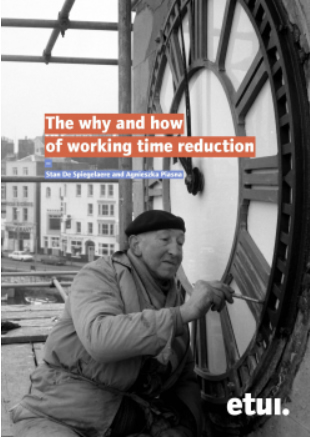For the last two centuries, Europe has experienced a significant decrease in working hours. The standard workweek has been cut in half from 80 to 40 hours, while the 8-hour workday became an international standard. Additionally, we achieved a two-day weekend and a minimum of 30 days of vacation in most countries. But despite the multiple technological advancements in automation, communication, and informatics, we continue to work the same hours as our grandparents. In some contexts of precarity, people are working even longer.
Europe faces an increasing polarisation of work-time regimes. While the reduction of work hours has slowed or even reversed for many full-time workers, many workers cannot ensure enough hours for adequate compensation. For traditional jobs, the boundaries between personal and labour time have been disrupted, not so much by technology itself but by the employers’ expectations for workers to be constantly connected and flexible to the market’s needs. Meanwhile, part-time and gig work continues to grow. Part-timers, particularly women, often face obstacles to career advancement, adequate pay, and job security. Gig workers, on the other hand, operate at undesirable hours, receive no compensation for “waiting times”, and face precarious conditions regarding their schedule, payment, and leave days.
However, the complexity of the different challenges workers face should not prevent us from pushing for a generalised decrease in working time. On the contrary, work-time reduction policies can potentially address several longstanding issues, including gender inequality, unsustainable economics, an ageing population, the burn-out epidemic, work-related health hazards, and unemployment. The success of work-time policies ultimately depends on their implementation.
In this sense, actors’ creativity in the field to recognize the particular needs of different stakeholders is crucial. Fortunately, we live in a moment of exciting experimentation. Cities are introducing legislation to set working time limits, unions keep reaching contractual reductions through collective bargaining, and companies launch trials of a four-day workweek. Each approach has pros and cons, making it essential to have a collective and democratic dialogue to discuss what is best for society. What is clear is that reducing working time is no longer a farfetched utopia.
The dream of working fifteen hours a week, as Keynes once predicted, remains a distant reality in our time. However, work-time regimes have never emerged automatically from economic conditions. The number of hours a particular society works is an inherently political issue. One that requires collective action, open dialogue, and evidence-based proposals. Reducing working hours is surely not a silver bullet, but its proven effectiveness and hoped-for potential are too high to dismiss it from the toolkit of labour policies.

Food for Thought
The Why and How of Working Time Reduction, Stan De Spiegelaere and Agnieszka Piasna, ETUI, 2017.
This guide maps the discussion on working time reduction by examining the recent trends, the different reasons for implementing such a reduction, and the ways in which it can be organised. Illustrated with numerous real-life examples and insights from research, this guide is a valuable resource for anybody wishing to know more about the working time reduction debate.